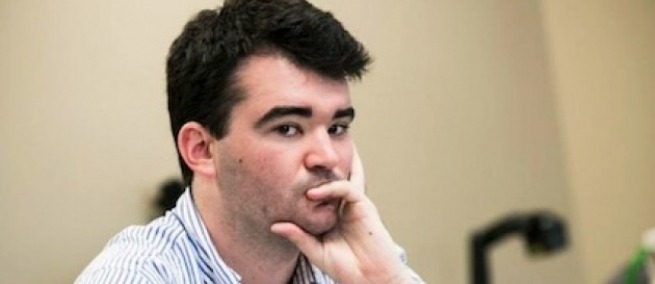
When Carnegie Mellon University announced this year's Sloan Script Competition winners, graduate student Dan Giles took first prize for his feature screenplay The Pill. Sloan Science and Film spoke with Dan about pharmaceutical chemistry, fathers and daughters, and bringing birth control to the big screen.
Sloan Science and Film: Can you tell our readers a little about yourself?
Dan Giles: I’m a playwright and screenwriter originally from New England, currently living in Brooklyn. I just graduated from Carnegie Mellon’s MFA Dramatic Writing program, and I recently made my New York debut as a playwright with a play called How You Kiss Me Is Not How I Like To Be Kissed, which I’ve been describing as a romantic comedy for people who can’t stand romantic comedies. In the long run, goals include forming a theatre company, writing for television, and getting every dog I meet to be my friend. At the moment, I have a few projects percolating that make me excited to get out of bed in the morning, but they’re nascent enough at this point that I shouldn’t tell the internet all about them, except that one of them is about hamsters. The Pill is my first full-length screenplay.
SSF: What’s The Pill about?
DG: The Pill tells the story of a visionary but conflicted chemist who is about to complete his masterpiece – the birth control pill – and his scientist daughter, who has to come to terms with her idol’s failures if she wants to follow in his footsteps. When Gregory Pincus invented the birth control pill in the 1950s, he had to go to Puerto Rico to perform the final human trials, because it was still illegal to distribute contraception in the United States. In Puerto Rico he got the data he needed, but he didn’t always communicate with the women in his trials about what exactly they’d gotten themselves into. Pincus’ daughter Laura (in our story, an aspiring chemist) came to San Juan to work for him, and that’s where our story starts. Vocation and family collide when the young scientist witnesses firsthand her father’s troubling methodology, and the human impact of their shared work strains their relationship not only as father and daughter, but also as mentor and protégé. Revolution comes with a cost, and the process of changing the world fundamentally alters Laura’s relationship with her father to the point where it must either evolve or die. I should note, since these are real people, that while I’ve stayed faithful to the scientific facts and the history of the experiments, this is a work of fiction, and the characters are heavily fictionalized.
SSF: What kind of science are we going to see in the film? Are you working with science advisors?
DG: We get to see some pharmaceutical chemistry in the film, and we also get to explore some questions about medical ethics, particularly through the lenses of colonialism and feminism. But the backbone of the drama is the negotiation between father and daughter about what it means to be a scientist – to build one’s life around the scientific process and its accompanying demands. That question resonates with me because I think in some ways, being a scientist must be similar to being a writer, and I can understand the gains and sacrifices that go along with doing what you love. In terms of the chemistry, I’ve had a lot of help from Joshua Sacher, who is a chemist at the Broad Institute of MIT and Harvard, a rescuer of troubled rabbits, and a huge rockstar.
SSF: Tell me a little about some of the challenges you’re anticipating in bringing the film to the screen.
DG: Well, it’s a 1950s period piece set in Puerto Rico, which presents some immediate budgetary obstacles. And I imagine when people think about birth control, they might not immediately think of riveting cinema. Of course, this is silly of them, because the history of how the pill got made is actually a crazy and fascinating story about revolution and sex and social justice, and how those things were never the same after this turning point in human history. And when it comes down to it, it’s a human story about family. Lots of people have families, so I have hope that this story will end up in front of a camera some day.
SSF:What are your next steps to get there? How have the funds from Sloan helped?
DG: I’ve had some interesting talks about The Pill, and I’m excited about its potential. My immediate next steps start with revisiting the script (which has some telltale signs of a first time at bat), and once I’m satisfied with my revisions, I can move forward with some collaborators. The grant from Sloan has been an enormous boon for which I’m truly grateful. It’s allowed me time and financial security to keep writing, which is the most important thing.
FILMMAKERS
PARTNERS
TOPICS